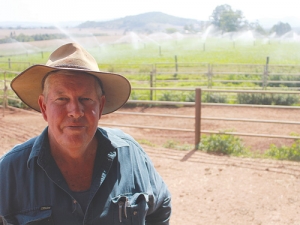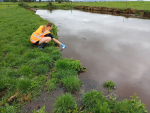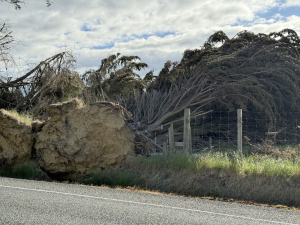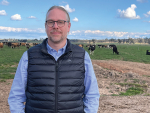Far North Queensland dairy farmer Dennis Byrnes expects a new effluent irrigation system to pay off in a variety of ways.
Byrnes, from Yungaburra on the Atherton Tableland, has connected his liquid effluent to a solid set irrigation and travelling irrigator.
Already he's seeing the benefits it's having on his pastures, enjoying a reduction in his fertiliser costs, and reducing the risk of nutrients building up in the soil potentially leaving the farm and entering the local waterway.
On top of that he's won a Reef Programme award for his initiative.
The work was done as a subsidised project with the Reef Programme which integrates incentives and agricultural extension to improve adoption of agricultural practices that deliver water quality benefits in the Great Barrier Reef Lagoon catchment.
It cost A$23,000 and Byrnes expects to recoup his costs within three years. "We've got solid set irrigation and with a bit of modification we were able to put the effluent through. It worked quite well," he said.
"We had most of the infrastructure there; it was just a matter of putting in some pipework and connecting it and changing some sprinkler and nozzle sizes to suit."
Byrnes said the effluent was a wasted resource if it couldn't be utilised.
"It's better than just flooding the area and we're already getting benefits from it. It's only been a couple of months but we've seen a difference in the pasture growth. The benefit of putting it directly on your pasture is outstanding. We expect over 12 months we'll see an increase in production."
The reduction in fertiliser costs is already starting to kick in.
"We worked out we'll save A$7000 a year on bought-in fertiliser," Byrnes said. "Prior to putting it in we used to get a contractor in to pump it out, and that came at a cost. It won't take long to pay it off."
The farm uses tropical pastures suitable for the local environment, including clover, ryegrass and chicory.
He milks 430 mainly Holsteins off an effective dairy area of 160ha with three-quarters of the land irrigated. About 25ha is being covered by the new effluent system and will be targeted for intensive production.
The family has been on the land for 60 years but like many farmers in the region Byrnes is battling low prices that he says restrict the ability of farms to upgrade facilities.
"There were 200 farmers here before deregulation; now we've only got about 48," he says.
"We've always gone with the theory that it should get better as we go along. Things weren't too bad until they introduced the $1/L milk. Because we're a fresh milk supplier it really affected us. There's no real chance of getting any decent price increase while that's happening."
Byrnes added the subsidy through the Reef Programme had helped to make the infrastructure upgrade possible. It's been a timely addition that should lead to better production, which is already going well.
"At the moment they're averaging 28L," he says. "We calve year-round so that's pretty good.
"This is our peak season and we're going okay. We had a bit of a slow start and didn't get much rain until February. It's been reasonable up till now but we're coming into our dry time until November."
Byrnes admits he's "pretty chuffed" about the award. "We supply Lion and we've won a few quality awards over the years, but nothing like this."
The Reef Programme awards acknowledge land managers who implement innovative or best management activities to enhance water quality for the Great Barrier Reef.


















